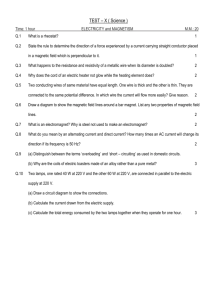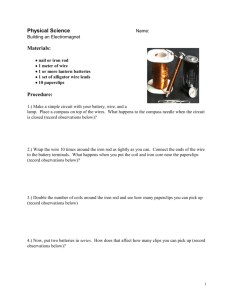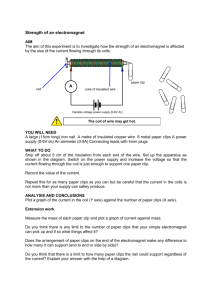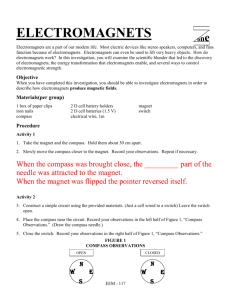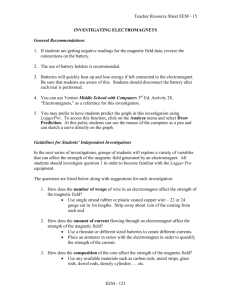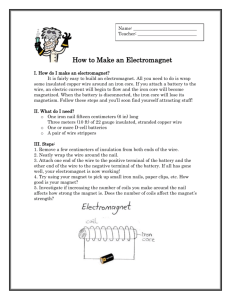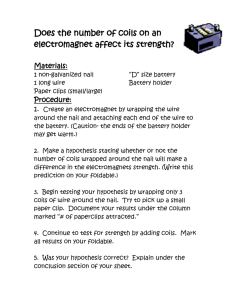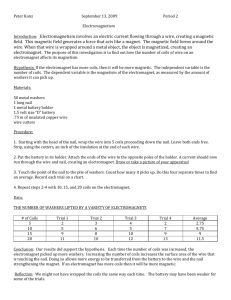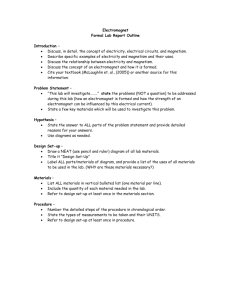Electromagnets - Cockeysville Middle School
advertisement
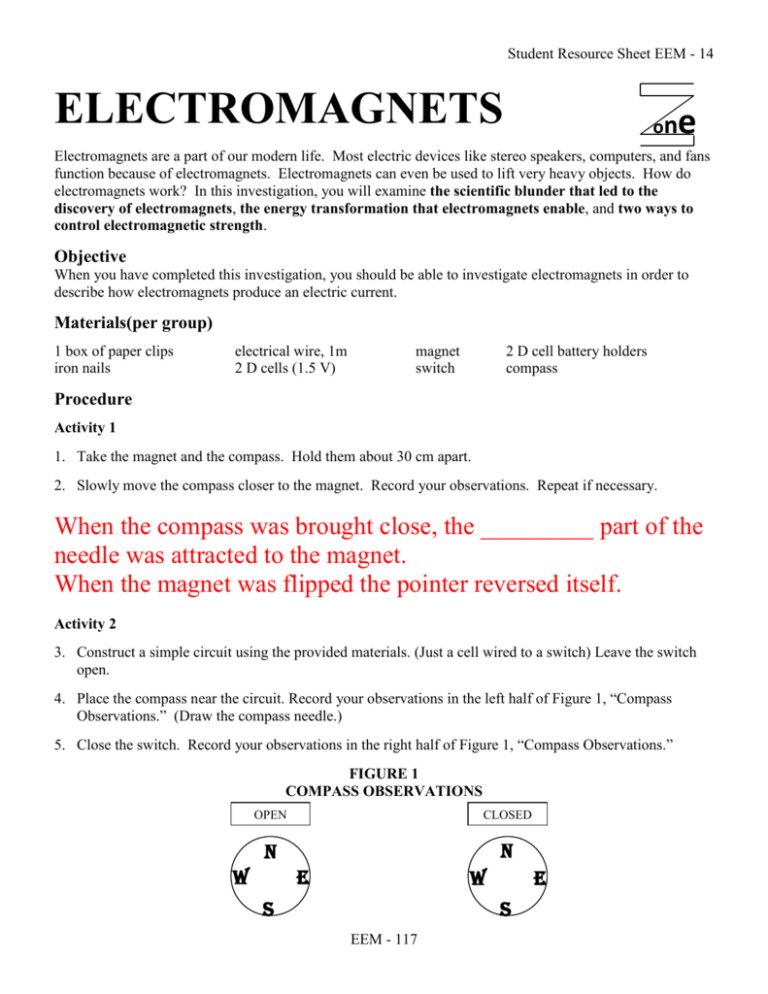
Student Resource Sheet EEM - 14 ELECTROMAGNETS on e Electromagnets are a part of our modern life. Most electric devices like stereo speakers, computers, and fans function because of electromagnets. Electromagnets can even be used to lift very heavy objects. How do electromagnets work? In this investigation, you will examine the scientific blunder that led to the discovery of electromagnets, the energy transformation that electromagnets enable, and two ways to control electromagnetic strength. Objective When you have completed this investigation, you should be able to investigate electromagnets in order to describe how electromagnets produce an electric current. Materials(per group) 1 box of paper clips iron nails electrical wire, 1m 2 D cells (1.5 V) magnet switch 2 D cell battery holders compass Procedure Activity 1 1. Take the magnet and the compass. Hold them about 30 cm apart. 2. Slowly move the compass closer to the magnet. Record your observations. Repeat if necessary. When the compass was brought close, the _________ part of the needle was attracted to the magnet. When the magnet was flipped the pointer reversed itself. Activity 2 3. Construct a simple circuit using the provided materials. (Just a cell wired to a switch) Leave the switch open. 4. Place the compass near the circuit. Record your observations in the left half of Figure 1, “Compass Observations.” (Draw the compass needle.) 5. Close the switch. Record your observations in the right half of Figure 1, “Compass Observations.” FIGURE 1 COMPASS OBSERVATIONS OPEN CLOSED N N W E W S E S EEM - 117 Student Resource Sheet EEM - 14 6. Explain the movement of the compass needle after the wire was connected to the circuit. Use prior knowledge about the effects of magnets on compass needles to support your answer. A compass reacts when brought into a magnetic field. This was shown with the magnet and compass in Activity 1. In Activity 2 the compass reacted when the circuit was closed. Therefore … The observations you just made represent one of the biggest blunders in the history of science. However, this blunder has revolutionized technology and enabled scientists to develop devices that convert electrical energy into mechanical energy. 7. Read the passage, “Oersted’s Surprise.” OERSTED’S SURPRISE Many of the greatest scientific discoveries have been lucky accidents. Electromagnetism was one of those. During a lecture in the year 1819, Hans Oersted had a compass sitting next to a wire. When Oersted completed the circuit by connecting the wire to a battery, the direction that the needle was pointing changed. This indicated that the electricity flowing through the wire had created a magnetic field. When he stopped the flow of electricity, the compass needle returned to its original position. Although most scientists are pleased by these unexpected discoveries, Hans Oersted was not. His lecture that day was supposed to Figure 1 demonstrate that electricity and magnetism have absolutely Solenoid nothing to do with each other. André Ampere followed up on this discovery and found that two parallel wires carrying electric currents running the same direction attracted each other. This observation led to the creation of a solenoid or coil as shown in Figure 1. In the solenoid, the magnetic field created by a loop of wire carrying an electric current joins together with the magnetic fields from other coils of wire to create more powerful magnetic force. This magnetic field only lasts as long as the electric current is flowing through the coils of wire. It has been found that the overall strength of the field could be further amplified by inserting a ferrous (iron containing) core into the center of the wire loops. This increased field strength occurs because the domains inside the metal core temporarily align with the magnetic field produced by the currents flowing through the wire coils. The magnetic field from the ferrous core joins with the magnetic field created by the wire loops surrounding the core. This combination can be used to create very strong magnets that can be turned on or off instantly, called electromagnets. Electromagnets can be used to lift heavy objects such as automobiles or scrap metal. They are also used to support the weight of Mag-lev trains like the super fast Yamanashi Maglev Test Line in Japan. EEM - 118 Student Resource Sheet EEM - 14 8. Reread “Oersted’s Surprise.” Highlight information related to how electricity flowing through a wire can be used to move objects and how that force can be controlled. 9. Explain why a compass needle moves when it is placed next to an electrical circuit. Use information from the reading to support your response. _______________________________________________________________________________________ _______________________________________________________________________________________ _______________________________________________________________________________________ _______________________________________________________________________________________ 10. Predict how altering the number of coils of wire wrapped around the core will impact the strength of an electromagnet. Justify your response using information from the reading. If the number of coils wrapped around the core is increased, then the strength of the electromagnet will ______________ because ___________________________________________________ Problem Question: How does the number of coils of wire wrapped around a core affect the strength of the electromagnet? 11. Underline the independent variable and circle the dependent variable in the problem question above. Activity 3 12. Read the procedure for building a ten-coil electromagnet. BUILDING AN ELECTROMAGNET A. Strip the plastic covering from the two ends of the wire. (This may already be done for you.) B. Make ten tight wraps around the middle of the nail, starting about 5 centimeters from the end of the wire. C. Place the D cell battery in the battery holder. Attach the first terminal of the battery to a switch. Leave the switch open. D. Attach one end of the wire to the switch and the other end of the wire to the second battery terminal. E. Close the switch to operate. Caution: Do not leave the switch closed for more than fifteen seconds at a time. The wires may become very hot. 13. Reread the procedures. Highlight the verbs in each step. 14. Construct a ten-coil electromagnet. EEM - 119 Student Resource Sheet EEM - 14 Activity 4 15. Read “Testing the Strength of an Electromagnet.” TESTING THE STRENGTH OF AN ELECTROMAGNET A. B. C. D. E. F. Place the paper clips in a small pile on the table. Complete the circuit containing the electromagnet by closing the switch. Place the tip of the electromagnet into the pile of paper clips. Remove the electromagnet from the pile. Count the number of paper clips adhering to the end of the electromagnet. Open the switch. Record the data in the appropriate space in Chart 1, “Effect of the Number of Coils on Number of Paper Clips Lifted by the Electromagnet.” G. Repeat steps A-F using electromagnets constructed with 20, 35, and 50 coils. ***If you get no reaction, check all connections. It may be necessary to attach a second cell. 16. Reread the procedures. Highlight the verbs in each step. 17. Complete the procedures. CHART 1 EFFECT OF THE NUMBER OF COILS ON THE NUMBER OF PAPER CLIPS LIFTED BY THE ELECTROMAGNET NUMBER OF COILS NUMBER OF PAPER CLIPS LIFTED BY MAGNET 10 20 35 50 18. Review your prediction for # 10. Explain how the data generated by the investigation supports or refutes your prediction. My prediction was shown to be (correct/incorrect). I predicted that… It was shown that as the number of coils increased, the strength of the electromagnet increased. As the number of coils increased, the number of paper clips lifted increased. 18. How else do you think you could increase the strength of an electromagnet? You can increase the strength of an electromagnet by increasing the voltage or by increasing the size of the core. EEM - 120 Student Resource Sheet EEM - 14 Analysis 1. Draw and label a simple electromagnet. Be sure to label the coil, core, wires, and battery. You are designing a machine as part of a car manufacturing process. The machine will pick up and move metal pieces weighing up to 2500 Newtons. While testing the metal core and wire to be used in the machine, Chart 2, “Lift Test Data”, was generated. Chart 2 Lift Test Data Number of Coils 50 100 150 200 250 2. Weight Lifted by Magnet (N) 340 650 980 1245 1600 Plot the data from Chart 2 on graph found in Figure 2, “Lift Test Data Graph.” Construct a line graph using a line of best fit for the data.. Figure 2 Lift Test Data Graph 400 EEM - 121 450 Student Resource Sheet EEM - 14 3. Estimate the number of coils needed to build the electromagnet strong enough to pick up a 2500 Newton weight. Support your response using information from the graph. ______________________________________________________________________________ ______________________________________________________________________________ ______________________________________________________________________________ ______________________________________________________________________________ 4. The magnet designed in question 14 was tested at 110 V. Describe a way of increasing the power without increasing the number of wraps. Support your response using prior knowledge and information found in this investigation. _____________________________________________________________________________ _____________________________________________________________________________ _____________________________________________________________________________ _____________________________________________________________________________ _____________________________________________________________________________ _____________________________________________________________________________ _____________________________________________________________________________ _____________________________________________________________________________ _____________________________________________________________________________ EEM - 122
